UCT students tackle food insecurity with groundbreaking tech solutions
30 September 2025 | Story Julia Evans. Photo Supplied. Read time 8 min.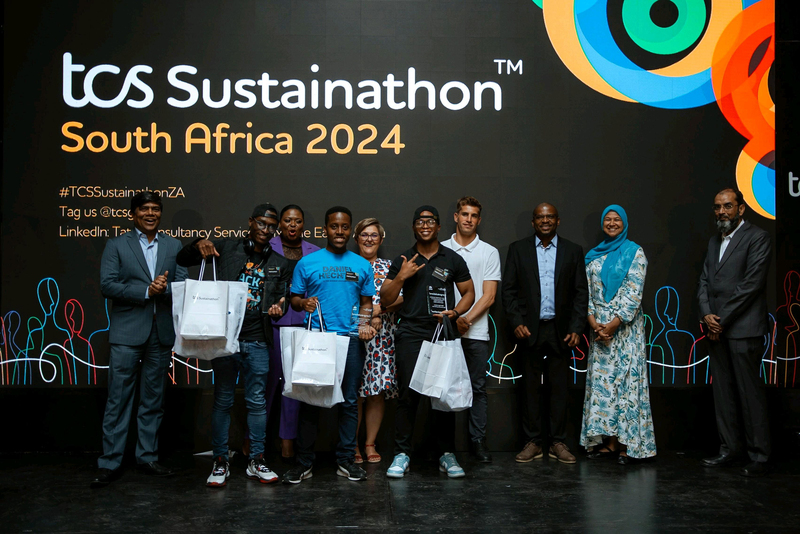
University students pitched practical, tech-based solutions to support small-scale farmers at the 2025 TCS Sustainathon, from affordable soil sensors to digital marketplaces and precision agriculture tools.
Earlier this month, 10 teams of university students from across South Africa gathered at Wits University to compete in the 2025 Tata Consultancy Services (TCS) Sustainathon. Now in its fourth year locally, the competition challenges young people to design practical, tech-based solutions to pressing social and environmental problems.
This year’s theme was sustainable agriculture and food security. Teams were tasked with tackling challenges such as helping township farmers access affordable tools, fighting child malnutrition and connecting small-scale growers directly with markets.
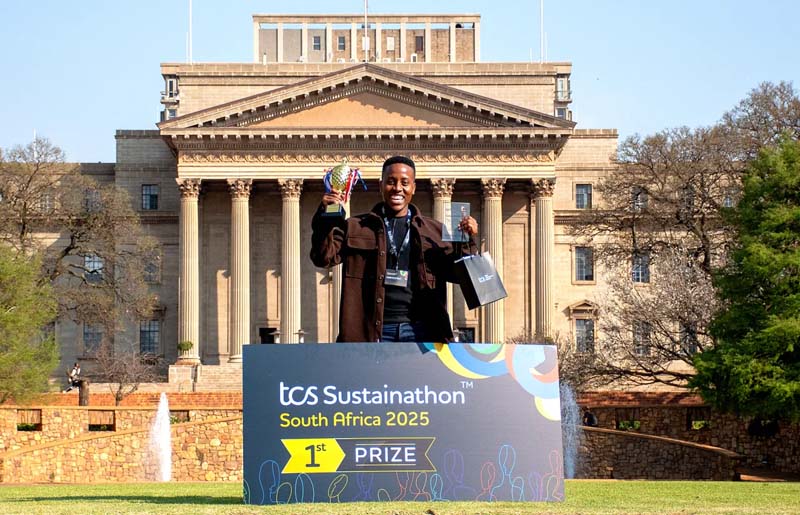
From more than 400 registrations across 50 universities, 10 finalist teams presented their solutions at the 2025 finale at Wits University on 8 September 2025. The top prize was R30,000 for first place, followed by R20,000 for second and R15,000 for third. The remaining seven finalist teams each received R5,000 in recognition of their work by TCS executives and academics.
“The jury selected the top three winners because they combined a strong problem-solution fit with disciplined scoping, end-to-end thinking and purposeful use of technology,” said Sumanta Roy, the president and Regional Head of TCS for the Middle East and Africa.
The TCS Sustainathon has tackled different challenges over the past four years. In 2024, the focus was “Affordable and Clean Energy”, and the winning team, Nexura — a collaboration between UCT, Wits, and Nelson Mandela University — developed Vitals-Vault, a portable, energy-efficient cooling solution for vaccines in rural areas.
This year’s theme reflects the pressures on South Africa’s agriculture sector, where drought, erratic rainfall, rising input costs and degraded soils are making it harder for farmers to produce enough food.
In 2024, about 22% of South African households experienced inadequate or severely inadequate access to food, according to Statistics South Africa’s General Household Survey, and regarding children under five, nearly 28% are stunted due to chronic malnutrition.
First prize: AgriSentry — sensors for the ‘small guys’
The winning project came from Team PowerLock, UCT engineering and computer science students Phemelo Maile, Mnelisi Mabuza and Mahlomola Mohlomi. Their project, AgriSentry, gives small-scale farmers affordable ways to understand and monitor their crops.
Many small-scale farmers can’t afford high-tech farming equipment and often don’t know when the soil is too dry, when rain is on the way, or how much fertiliser is being washed away. This leads to wasted water, lower yields and lost income. They also struggle to keep a record of farm performance, making it harder to qualify for loans or insurance.
AgriSentry tackles this with simple, low-cost sensors placed in the ground and around fields. These measure:
- Soil moisture — to tell when the crops actually need water, preventing over or under watering.
- Sunlight — to show how much light crops are getting.
- Temperature — so farmers can see when conditions become too hot or cold.
All this information is collected and sent to a central unit, which turns it into easy-to-read advice. Instead of confusing graphs, farmers get clear SMS alerts — in their own language — telling them things like: “Your maize field needs water today,” or “Stop irrigating, rain is expected.”
Over time, the system also builds up a record of the farm’s performance. That “track record” is crucial: it can be shown to banks or cooperatives as proof that the farmer is running a productive operation, opening the door to credit, subsidies or crop insurance.
“Essentially what our solution addresses is being able to make affordable sensors for farmers who are working on their crops, either in their backyard or who have small farms,” explained team member Phemelo Maile, who is currently pursuing a PhD in Electrical Engineering at UCT.
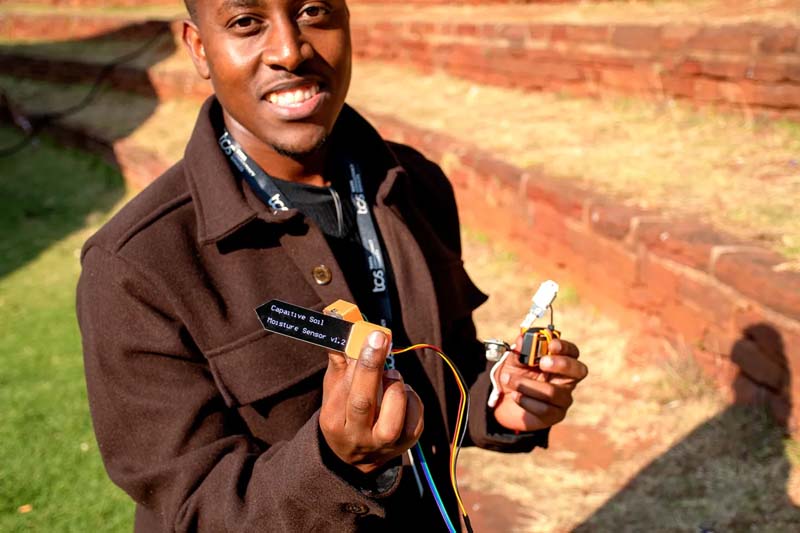
He said he was inspired by the way large agricultural companies used technology to double their yields.
“I was like okay, but what about the small guys? Can’t they double their yields, double their profits as well?”
The team has already built and tested a prototype and set up a website to manage farmer data. Their plan is to start by working directly with a handful of local farmers, then refine the devices and expand step by step. Farmers will buy a basic starter kit at cost price — about R2,000 for a system that covers two hectares — and can add more sensors as they grow. After three months, they can pay a small subscription for more detailed reports.
“The first‑place team stood out for exceptionally clear storytelling that mapped an end‑to‑end use case with key variations, set realistic boundaries around what is feasible, and demonstrated responsible AI practice by training an initial model tailored to their solution, showing deep understanding rather than reliance on AI as a catch‑all,” said Roy, the TCS executive and Sustainathon judge.
They had entered the competition before, without success, but came back stronger. They now plan to channel their prize money into refining prototypes, testing with farmers and possibly exploring adjacent ventures such as small-scale aquaculture.
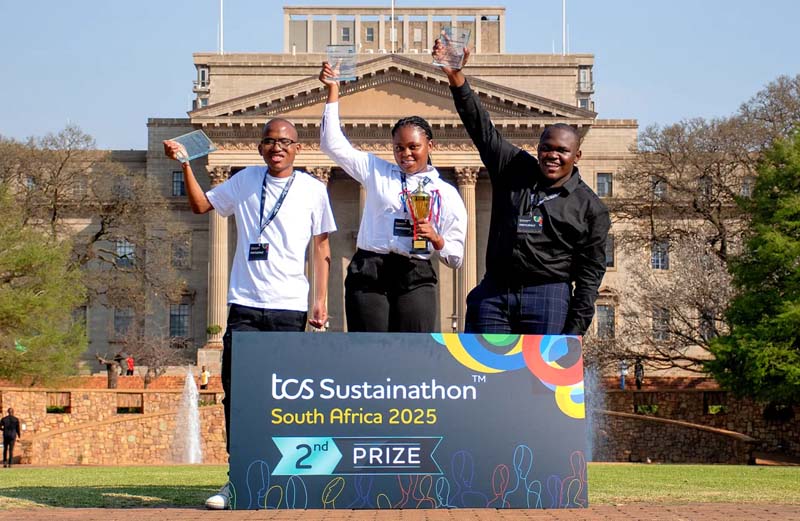
Second prize: Sustainorise — building a digital marketplace for farmers
In second place was Sustainorise, a trio from Wits University students Daniel Maake, Tukiso Madiba and Pula Morema
Their project, Peu, is a web platform designed to connect rural farmers directly with urban markets, cutting out middlemen and ensuring fair trade.
The team, two pharmacy students and a civil engineering student originally from Limpopo, who met in school, drew inspiration from the struggles of rural small-scale farmers they saw growing up in their province. These farmers often experience poor productivity, waste due to spoilage and unfair pricing.
Peu addresses these gaps by offering two main components:
- Marketplace: a digital storefront where buyers can order produce, compare prices and interact directly with farmers.
- Social Farm: a networking hub described by one team member as “the Facebook of farming”, where farmers can share knowledge, build connections and access tutorials on soil health and organic pest control.
“In the finance hub [they created], that’s where a farmer can see things like their credit score and how the farm is operating,” said Maake. “This will allow for potential investors to invest in the farm.”
The platform supports all South African languages to improve accessibility, integrates with payment services such as Capitec Pay and Mukuru, and uses AI to forecast demand — helping farmers reduce waste by producing only what is needed.
Their roadmap includes piloting the web app, expanding to mobile and eventually rolling out to southern Africa.
“But now we’re trying to be feasible and make this implementable,” the team said.
The judges commended the team for “adopting a pragmatic, implementation‑ready approach by building on existing, proven technologies and thoughtfully integrating components, such as Google Maps, to deliver immediate functionality”.
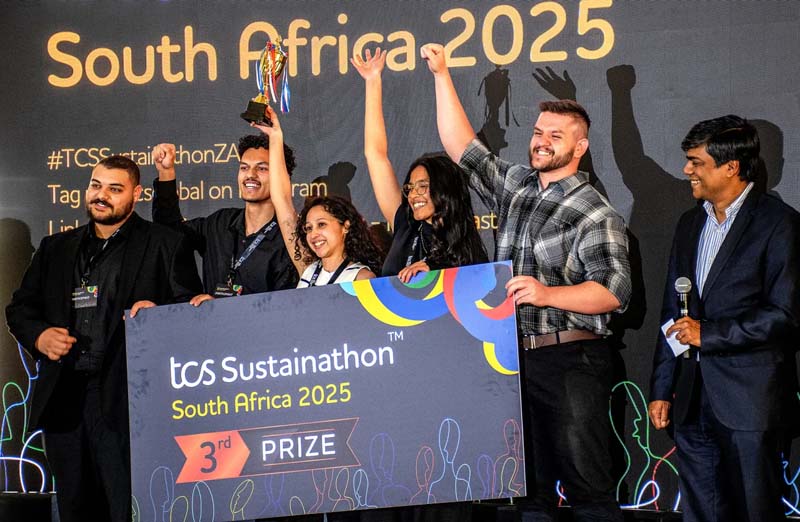
Third prize: Agri-link — precision tools for smallholders
The third prize went to Agri-link, a team of Eduvos Midrand students Zoe Hendricks, Amber Pillay, Taariq Smith, Emanuel Messiha and Wentzel du Toit.
The team, a mix of data science, robotics, software engineering and computer science students, produced a system of smart sensor nodes and an “insight engine” to give smallholder farmers affordable access to precision agriculture.
The team showcased a 3D-printed prototype of their solar-powered nodes, which can track soil moisture, temperature and other micro-climate data. The information is processed into farmer-friendly advice and delivered via app, SMS or Unstructured Supplementary Service Data — designed to work offline in areas with limited connectivity.
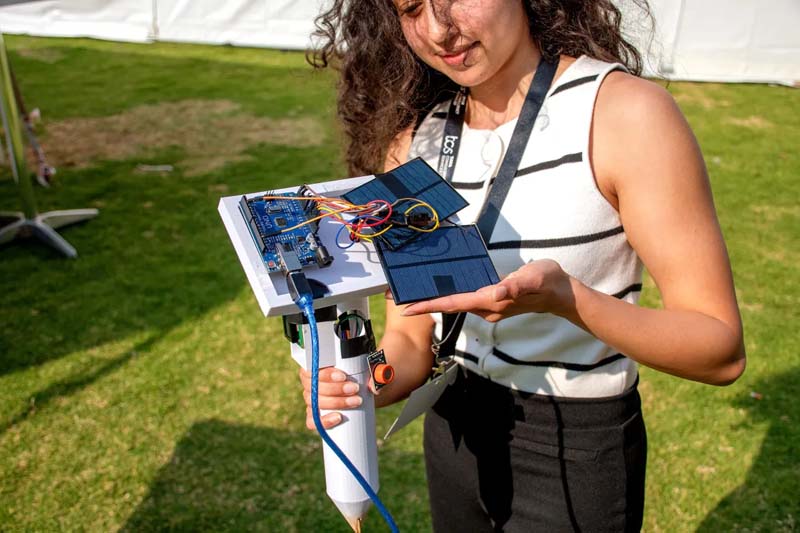
“We essentially just wanted to design a system that helped empower farmers and give them access to better data so that they could make better decisions,” said Hendricks.
The Agri-link system also includes a crop health diagnosis tool, a community forum, and a subscription-based business model. The team estimates the approach could deliver a 25% increase in yields, 30% reduction in water use and 20% reduction in fertiliser inputs.
“Climate variability is such a big factor,” Hendricks said. “In Johannesburg, I think you can get some rainfall, but it’s so unpredictable. So, having that knowledge knowing if it’s going to rain tomorrow… they can make better decisions.”
The judges said the team showcased a well‑judged mix of the right technologies, brought a 3D‑printed prototype, and articulated the entire value chain from upstream through delivery.
Farming for the future
Beyond the technical ingenuity, what stood out across all three winners was their insistence on designing for the realities of South Africa’s farmers — cost constraints, language diversity, patchy internet and the weight of climate unpredictability.

“Across these entries, the winners avoided ‘technology for technology’s sake’, recognised what could be credibly delivered now, and presented realistic roadmaps to pilot and scale,” said Roy.
For Langa Dube, TCS regional director for South Africa and the Rest of Africa, “the creativity, determination and technical skill we have seen from these young innovators is truly inspiring.
“They are not only imagining a better future, they are also actively building it — and that gives us great hope for a more sustainable South Africa.” DM










